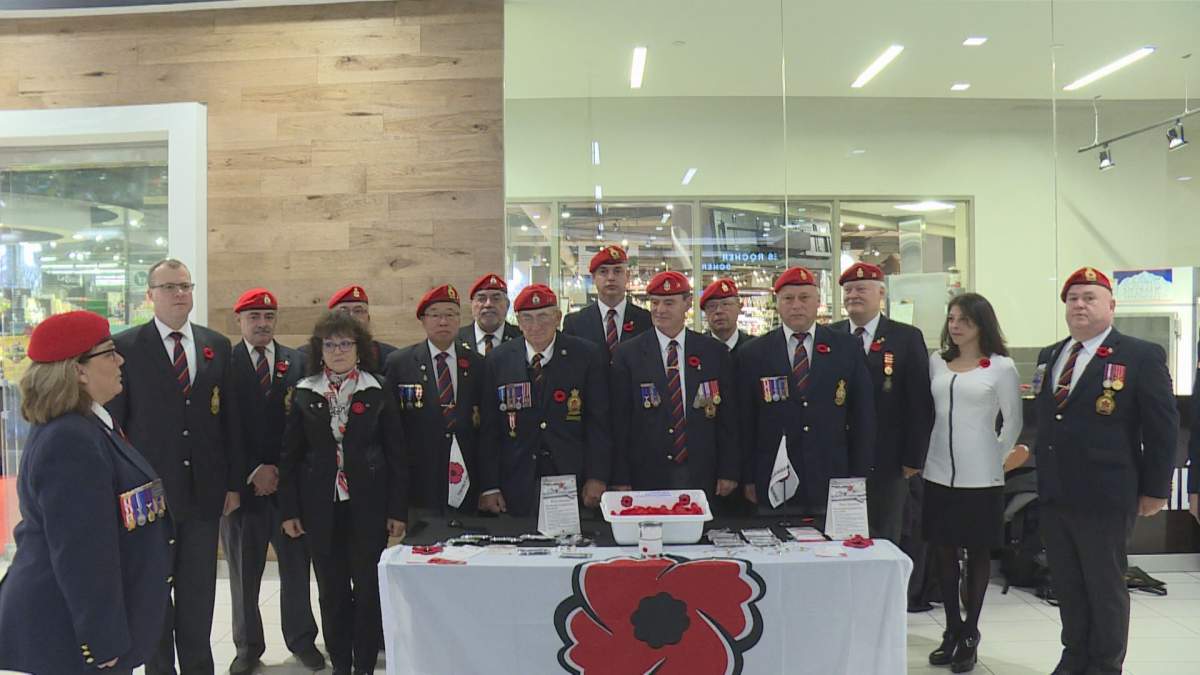Even as this year’s poppy drive began in earnest toward the end of October, the Quebec command of the Royal Canadian Legion struggled to find volunteers to work on its annual remembrance campaign.

The national effort typically distributes about 20 million poppies annually and raises about $16 million for Canada’s largest veteran support and community service organization.
But as the red and black flower pins began to appear on the lapels of Canadians this year, Quebec organizers were dealing with an increasingly common problem: a lack of people to collect donations.
“It’s been like this for years,” said Kenneth Richard Ouellet, who oversees the province’s 104 Legion branches, when asked how long the lack of volunteers had been an issue.
READ MORE: Chomedey legion looking for donation cans missing from four Tim Hortons locations
Ouellet said the majority of legion members are 65 or older and many volunteers are unable to physically give as much as they once did, Ouellet said.
“We’re not getting that many young recruits,” he said. “They haven’t been brought up in this culture.”
Ahead of the campaign launch on Oct. 25, Ouellet spoke to The Canadian Press about a lack of volunteers for the campaign. In the days that followed, central command saw a jump in civilians ready to pitch in.
Ouellet, who said the legion also sent out a request to members seeking help, said the response was encouraging — particularly in places like Thetford Mines, where the legion branch has been closed for more than five years.
READ MORE: Poppy 2.0: Remembrance Day symbol gets a digital makeover

Get daily National news
He said it’s a numbers game in Quebec, which has far fewer legions than other parts of the country and also has to deal with a linguistic divide in addition to the demographic one.
For a long time, the legion was regarded as an English establishment, Ouellet said. While that has changed over time, many branches are still primarily English-speaking.
Another issue is elderly members abandoning the province’s rural regions for Montreal, where they can get better services and health care.
Paulette Cook, the executive director of the Quebec command, said she was thrilled to see volunteers stepping in to help, knowing veterans aren’t able to take part anymore.
“There are people who tell us it’s been 30, 40, 50 years that they’ve been doing this, but they can’t do it anymore,” said Cook. “It breaks their heart also, but we’re happy that younger people are starting to approach us and we hope more will in the future.”
She gave the example of fraternities from McGill and Concordia universities, which have distributed poppies at Montreal’s major transit hubs for the past four years or so.

Cook said veterans often attend local elementary and high schools to explain the poppy campaign and its importance.
“It’s just a matter of education as far as I’m concerned,” Cook said. “They’re a different generation than mine, I grew up in the legion — a lot of them don’t know what the legion is.”
Nujma Bond, a spokeswoman for the Royal Canadian Legion’s national headquarters, said she was aware of the volunteer shortage in Quebec, but said the problem seemed to be limited to that province.
“It’s not been our experience across the country,” she said. “There might be pockets of volunteer challenges here and here at any given time, but at a national level we’re not hearing about volunteer issues.”
READ MORE: Annual Remembrance Day poppy campaign underway in Montreal
Donations collected during the poppy campaign, which continues until Nov. 11, are held in trust at the branch level to support veterans and their families within their community.
Ouellet, a veteran of both the reserve and regular Forces, said he is struck by how Canadians’ collective memory of veteran sacrifices varies according to their age; however, he doubts that younger generations will forget.
He cited the Sept. 11, 2001, terror attacks, and the subsequent Canadian mission in Afghanistan that saw 151 soldiers and seven civilians killed over the course of a 12-year deployment.
“When I walk down the street with my legion blazer and my medals, I get stopped by people thanking me for my service to Canada and its people,” said Ouellet, who served in Croatia, Bosnia-Herzegovina and Afghanistan.
“It comforts me, makes me feel good knowing that we and our families are supported.”
— With files from Sidhartha Banerjee







Comments
Want to discuss? Please read our Commenting Policy first.